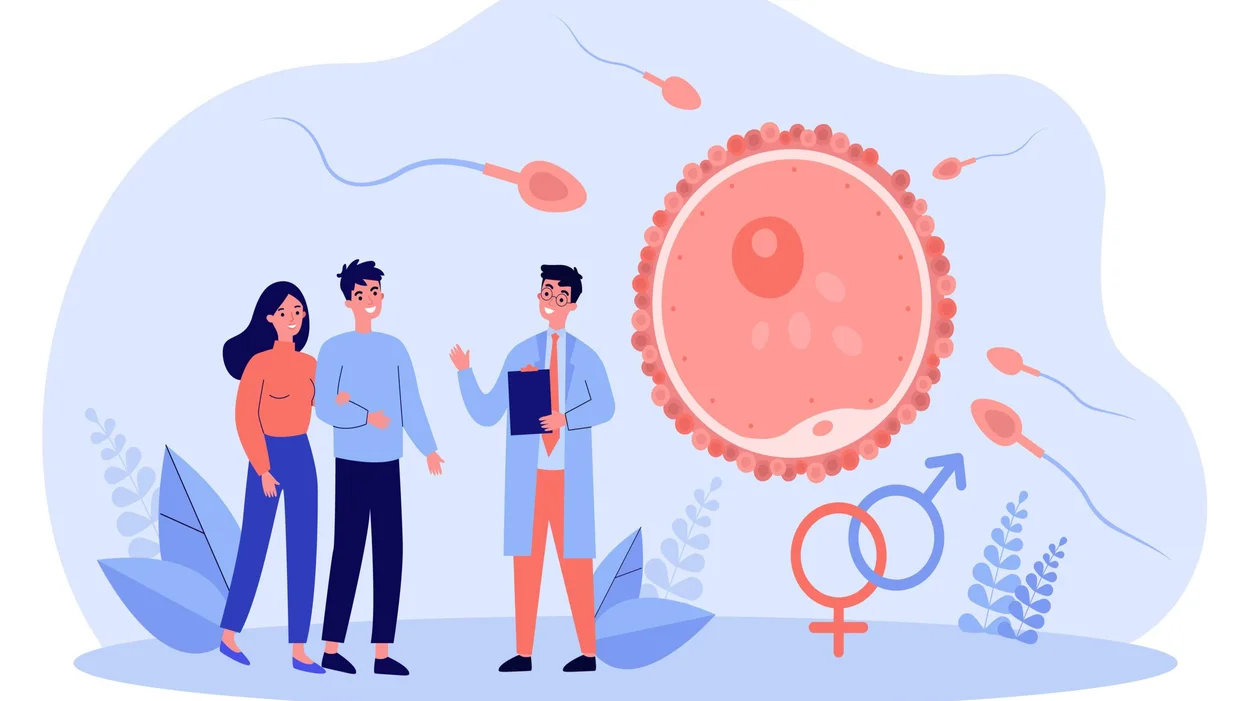You don’t have to be planning a pregnancy right now to care about your fertility. A simple fertility test for women can give you insight into your hormone levels, ovarian reserve, and even catch early signs of conditions that might affect your chances later.
According to the CDC, about 1 in 5 married women aged 15 to 49 face trouble getting pregnant after one year of trying—that’s not rare.
Tests like a blood test, which is crucial for assessing hormone levels and ovarian function, pelvic ultrasound, or a quick review of your medical history can help you stay informed. If anything shows up, it gives you time to act—not panic.
Introduction to Fertility
Fertility is a complex and multifaceted aspect of human health, influenced by a variety of factors including hormonal balance, reproductive organs, and overall well-being. For women, fertility is closely tied to the menstrual cycle, with the release of follicle-stimulating hormone (FSH) and luteinizing hormone (LH) playing crucial roles in ovulation and egg production.
Understanding the basics of fertility is essential for individuals and couples seeking to conceive, as it can help identify potential issues and inform treatment options. Reproductive medicine, a field that encompasses the diagnosis and treatment of fertility problems, offers a range of tests and interventions to support individuals in achieving their reproductive goals.
What is Fertility test for women?

A fertility test for women checks if your body is working the way it should to support pregnancy. It usually starts with a physical exam and a quick chat about your medical evaluation and sexual habits—nothing scary, just personal basics.
Doctors may also ask about your menstrual cycle and birth control history. If conception has not occurred after a year of trying, both partners should be tested to ensure an accurate diagnosis and targeted treatment. These things help spot common signs of fertility trouble or risk factors like sexually transmitted diseases that could affect fertility.
“Infertility is defined as not conceiving after 12 months of unprotected sex,” says the Mayo Clinic. That’s why early checks matter—even if you’re not actively trying.
What Factors Can Affect Fertility in Women?
You might think fertility only becomes a concern when you’re trying to get pregnant. But in reality, many things can affect your chances long before that point—and not all of them are obvious. Knowing these early can help you make informed choices and stay one step ahead. Studies suggest certain tests may be more effective in diagnosing fertility issues.
1. Hormonal Imbalances
- Conditions like polycystic ovarian syndrome (PCOS) or an underactive thyroid gland can disrupt ovulation.
- Issues with the pituitary gland may affect how your body releases reproductive hormones. Follicle-stimulating hormone (FSH) plays a crucial role in regulating a woman's menstrual cycle, particularly in relation to the growth of ovarian follicles.
- An imbalance in male hormones or raised hormone prolactin levels can signal underlying problems.
2. Physical and Structural Issues
- Scar tissue or endometriosis may block the fallopian tubes or damage the uterus.
- Laparoscopic surgery can leave behind a small incision that affects the reproductive pathway.
- Abnormalities in the uterus and fallopian tubes may need further imaging like x rays or transvaginal ultrasound. Hysterosalpingography (HSG) involves using X-ray technology to visualize the internal shape of the uterus and check for blockages in the fallopian tubes.
3. Sexual and Lifestyle Factors
- Unprotected intercourse and certain sexually transmitted diseases may go undetected and impact fertility later.
- Use of illicit drugs, smoking, or alcohol can affect ovarian function and fertility problems.
- Regular exercise is good, but excessive workouts may actually lower fertility in some women.
4. Ovulation and Egg Quality
- Disruptions in the menstrual period or irregularities in the woman’s menstrual cycle could be signs of hormonal issues.
- Low ovarian reserve testing results may show fewer quality eggs available. The ovary produces Anti-Müllerian Hormone (AMH), which is crucial for assessing ovarian function and egg reserve.
- Factors like poor egg quality or unexplained infertility often require further genetic testing.
5. Male Factors Also Matter
- While often overlooked, sperm count, sperm production, and even low sperm count in a partner can silently affect your chances.
- According to the CDC, about one-third of infertility cases are due to male infertility—so both partners should get evaluated.
There’s no one-size-fits-all cause for fertility trouble. If you're unsure, even one visit with an infertility specialist or a first appointment for basic evaluation can offer peace of mind. Sometimes, it's about learning what’s not the issue—and that’s just as important.
What Does Dr. Anshu Agarwal Say About Early Fertility Awareness?
-min.png)
Dr. Anshu Agarwal is a renowned gynecologist based in Ranchi, India, with over 18 years of experience in obstetrics and gynecology. She specializes in laparoscopic surgeries and infertility treatments, having helped over 300 patients achieve successful pregnancies without requiring IVF. Dr. Anshu Agarwal
Dr. Agarwal has served as a senior resident at Safdarjung Hospital, New Delhi, and currently leads the Department of Obstetrics and Gynecology at Medifirst Hospital, Ranchi.
Early fertility awareness isn't just for those planning a baby soon. Dr. Agarwal emphasizes that understanding your reproductive health early can prevent potential issues down the line. It's about being informed and proactive.
She notes, "Understanding how your reproductive system works is key to understanding your fertility."
According to the CDC, about 1 in 5 women aged 15–49 experience infertility after one year of trying without success.
Key insights from Dr. Agarwal on early fertility awareness:
- Track Your Menstrual Cycle: Monitoring your cycle can help identify irregularities early.
- Understand Hormonal Health: Hormones like follicle-stimulating hormone (FSH) and luteinizing hormone (LH) play crucial roles in ovulation.
- Regular Check-ups: Routine gynecological visits can detect issues like polycystic ovarian syndrome (PCOS) or thyroid gland disorders that may affect fertility.
- Lifestyle Factors: Maintaining a healthy weight, managing stress, and avoiding illicit drugs can positively influence fertility.
- Early Testing: If you have concerns, consider early fertility tests to assess ovarian reserve and other factors.
Being informed about your reproductive health empowers you to make decisions that align with your future family planning goals. If you have questions or concerns, consult with a healthcare professional for personalized guidance.
5 Reasons to Consider Fertility Testing Before Planning Pregnancy

You don’t need to be trying to get pregnant to care about your fertility. Testing early can help you understand your body better—and make decisions that feel right for you, not the calendar.
Here’s why women are choosing to explore fertility testing early, even when pregnancy isn’t an immediate goal:
1. Detect Hidden Fertility Issues Early
- Some issues like endometriosis, blocked tubes, or ovaries that aren’t functioning well can go unnoticed for years. You might not realize something’s wrong until you try to conceive—and by then, options may be fewer.
According to the CDC, in nearly 10% of infertile couples, both partners have contributing issues.
- Primary infertility involves a couple's inability to conceive after a year of trying, while secondary infertility refers to couples who have previously conceived but are now facing challenges in doing so again.
- That’s why early testing—especially with tools like transvaginal ultrasound or discussions around sexual desire and history—can make a huge difference.
2. Understand Your Ovarian Reserve
- Knowing how many eggs you have isn’t just for curiosity. A test for anti-Müllerian hormone (AMH) gives a snapshot of your ovarian reserve, helping you plan ahead—especially if you might want to delay pregnancy.
- Doctors may also use hormone tests, like follicle stimulating hormone (FSH) or luteinising hormone, to better understand how your ovaries are responding.
3. Make Informed Lifestyle and Career Decisions
- Let’s be honest—timing pregnancy with personal goals can be tricky. If you're thinking about freezing your fertilized eggs or delaying motherhood for personal or professional reasons, knowing your fertility status now helps you do that with confidence.
- Tests also help uncover if lifestyle factors or underlying issues like thyroid imbalance or low sexual desire could be impacting your future fertility.
4. Get Ahead of Age-Related Fertility Decline
- You may feel healthy now, but egg quantity and quality decrease with age—even when your menstrual cycle seems regular. Testing before age 35 can give you more choices, not fewer.
As reproductive medicine experts explain, “Fertility begins to decline slowly in your early 30s, and more quickly after 35.”
- By identifying ovaries that may not be functioning optimally or changes in hormone levels, you get to decide next steps while you still have them.
5. Feel Confident and Prepared for the Future
- Early testing removes the guesswork. Whether results are normal or not, you’ll know exactly where you stand.
- You may never need treatments like vitro fertilization or reproductive medicine support—but wouldn’t it feel better to have that peace of mind now?
What Are the Common Fertility Tests for Women?

Fertility testing doesn’t mean jumping into treatments. It’s about understanding how your body—and your partner’s—are functioning when it comes to getting pregnant. These tests are simple, often non-invasive, and help build a clearer picture of your reproductive health.
1. Medical History and Physical Examination
Doctors start with a conversation and a basic check-up. This includes questions about your menstrual cycle, birth control, sexual habits, and any past health issues.
- Review of past illnesses, medical history, and surgeries
- Check for signs of polycystic ovarian syndrome, thyroid imbalance, or hormonal shifts
- Evaluation of general health and reproductive symptoms
2. Pelvic Ultrasound and Imaging
These tests help visualize the uterus and ovaries. They’re safe, quick, and painless.
- Pelvic ultrasound to check reproductive organs
- Transvaginal ultrasound to view ovaries, follicles, and uterus
- Imaging may detect cysts, scar tissue, or fibroids
3. Blood Tests for Hormone Levels
Hormone levels affect ovulation, egg quality, and timing. That’s why a blood test is key in early evaluations to check hormone levels and overall reproductive health.
- Checks for hormone levels like estrogen, hormone prolactin, and thyroid hormones
- Identifies imbalances from the pituitary gland or male hormones
- Used to monitor cycle patterns and ovulatory function
4. Anti-Müllerian Hormone (AMH) Test
This test checks your ovarian reserve—or how many eggs you might have left.
- Simple blood draw
- Often recommended for women over 30 or with irregular cycles
5. Luteinizing Hormone (LH) and FSH Tests
These tests help evaluate how well your ovaries respond to signals from your brain.
- Follicle-stimulating hormone (FSH) reflects egg quality
- Luteinising hormone surges before ovulation
- Important for detecting ovulation disorders
6. Semen Analysis for Male Partner
It’s not just about women—male infertility accounts for 30–40% of cases.
- Measures sperm count, shape, movement, and sperm production
- Checks for infections or low sperm count
7. Other Tests If Needed
In some cases, your doctor may suggest more testing based on initial results.
- Other hormone tests to rule out rare conditions
- Advanced imaging using a flexible tube
- Genetic panels or further infertility tests
Each of these fertility tests gives doctors—and you—more clarity. They help detect causes of fertility problems early and give you time to take action that’s right for your body and your life.
Which Blood Tests Help Understand Female Infertility?
Before diving into treatments, doctors often start with blood tests to check your hormone levels and overall reproductive health. These tests offer clear insights into what’s happening inside your body—even if everything seems normal on the outside.
Here's a quick look at the most common blood tests used to understand female infertility and what each one reveals.
Conclusion
You don’t need to be planning a baby to take your fertility seriously. A simple test today can give you peace of mind, clarity, or even an early heads-up—without any pressure to act right away.
Understanding your body now puts you in control of your future, whether you want to conceive next year or not at all. If you're feeling unsure or just curious, that's reason enough to ask questions. As Dr. Anshu Agarwal often reminds her patients: informed choices start with awareness—not urgency.


.jpg)

.jpg)


